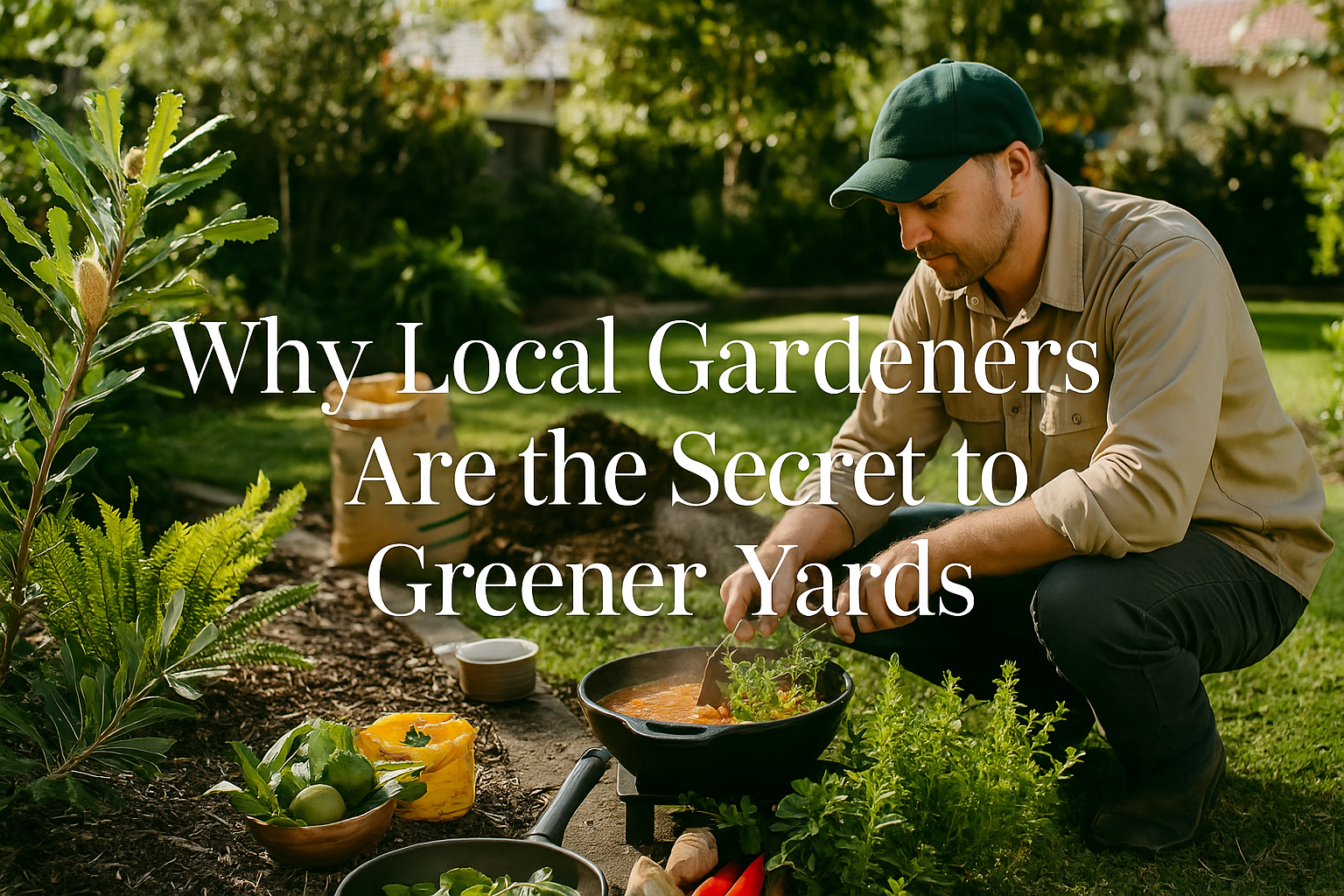In the era of online bookings and large-scale landscaping companies, it’s easy to forget the unique advantages of working with someone who actually lives nearby. Local gardeners often fly under the radar, yet their deep understanding of neighbourhood conditions — from soil type to council regulations — gives them a powerful edge.
I didn’t realise how much this mattered until I switched from a commercial lawn service to a gardener who lives two streets over. Within two months, my patchy kikuyu lawn looked thicker. My wisteria stopped sulking. And for once, my compost didn’t smell like a science experiment.
The point? When you hire from your own community, you don’t just get a service — you get someone who’s genuinely invested in keeping the area green and thriving. Especially if you’re after help with routine gardening maintenance services, choosing local can offer better consistency and more reliable follow-up.
Local knowledge means smarter planning
No two suburbs are exactly alike — and anyone who’s tried growing citrus in coastal soil knows this all too well. Local gardeners have walked the same terrain, weathered the same droughts, and likely worked with the same pests and councils you’re dealing with.
That means better advice, tailored planting, and smarter water use.
Here’s how that plays out in practice:
-
Recommendations tailored to your microclimate and soil type
-
Local insights on pest control and seasonal timing
-
Water-efficient planting plans specific to your council rules
-
Reduced waste through fewer failed plantings and better plant choices
And if sustainability matters to you, that local context becomes even more important. There's a growing push for sustainable gardening practices, and much of that starts at the grassroots level — literally.
Gardening is seasonal, and locals move faster
There’s nothing worse than missing the seasonal window to prep your soil, fertilise citrus, or cut back your hydrangeas. Local gardeners tend to have tighter response times, which makes all the difference in a climate as variable as Australia’s.
Why this matters:
-
Faster turnaround before storms or heat waves
-
Seasonal jobs done at the right moment, not weeks too late
-
Realistic plant pairings that suit the local cycle
-
On-the-ground knowledge that saves time and money
They also work with realistic expectations. I once had a local gardener explain that my dream of a cottage garden under a lemon-scented gum wasn’t impossible — just unwise. Instead of taking my money, he suggested hardy natives and helped me lay out a dry shade bed that now thrives with minimal input. A good local gardener will tell you what won’t work, not just what you want to hear.
Choosing the right gardener isn't just about price
It’s easy to assume all gardening services are equal. But there’s a big difference between a mow-and-blow service and someone who actually understands plant health, irrigation, and design. Choosing a gardener is more than comparing hourly rates.
If you're not sure where to start, understanding how to choose a reliable gardener can save you time, stress, and money.
Things to look for:
-
Experience with your local soil and plant types
-
Transparent quoting and good communication
-
Willingness to visit and assess your space
-
Referrals or reviews from other local clients
When I was hiring, I asked for a site visit. The gardener brought up council tree protections I hadn’t even considered and suggested hardy replacements for a struggling viburnum hedge. That ten-minute chat told me more about his skills than any online listing ever could.
Small-scale gardeners, long-term impact
Local gardeners don’t just mow lawns — they often contribute to the slow greening of a neighbourhood. Whether it’s restoring native beds, reducing fertiliser runoff, or introducing neighbours to drought-tolerant landscaping, their footprint adds up.
The local impact adds up through:
-
Shading and cooling effects in urban areas
-
Reduced reliance on chemical inputs
-
Resilient landscapes that handle local weather extremes
-
Long-term improvements to biodiversity and pollination
What’s more, these small businesses often support local nurseries and soil suppliers, reinforcing the local economy in ways that big chains rarely do. Supporting someone who lives and works nearby means you’re also investing in your local green infrastructure.
Gardeners aren’t just labour — they’re design allies
We tend to think of gardening as either DIY or outsourced maintenance. But a great local gardener often plays a hybrid role — offering design input, plant pairing advice, and layout recommendations, especially for those who want low-maintenance beauty.
If you’re redesigning or refreshing a space, exploring garden design tips can be a great starting point.
Common contributions from gardeners include:
-
Garden layouts that match your sun/shade conditions
-
Planting combinations that work with your watering habits
-
Soil improvement suggestions based on location
-
Creative re-use of existing plants or hardscape materials
Design doesn’t have to mean expensive landscaping plans. Sometimes, it just takes a trained eye, a practical suggestion, and the right mix of perennials.
Final thought: Start small and think local
You don’t have to overhaul your entire yard or install greywater systems to make a real impact. Sometimes, the simplest move — like hiring someone who understands your area’s seasonal rhythm — makes the biggest difference.
A local gardener can help revive neglected garden beds with plant choices that are well-suited to your soil and climate. They’ll often improve your soil health and moisture retention without relying on chemicals, and they can offer strategies to reduce weeds and pests using organic, low-maintenance methods. Even small upgrades, planned in the right season, can transform the look and feel of your yard.
A few hours a month with the right person can turn your space from patchy to productive — and the rewards go far beyond the garden bed.



